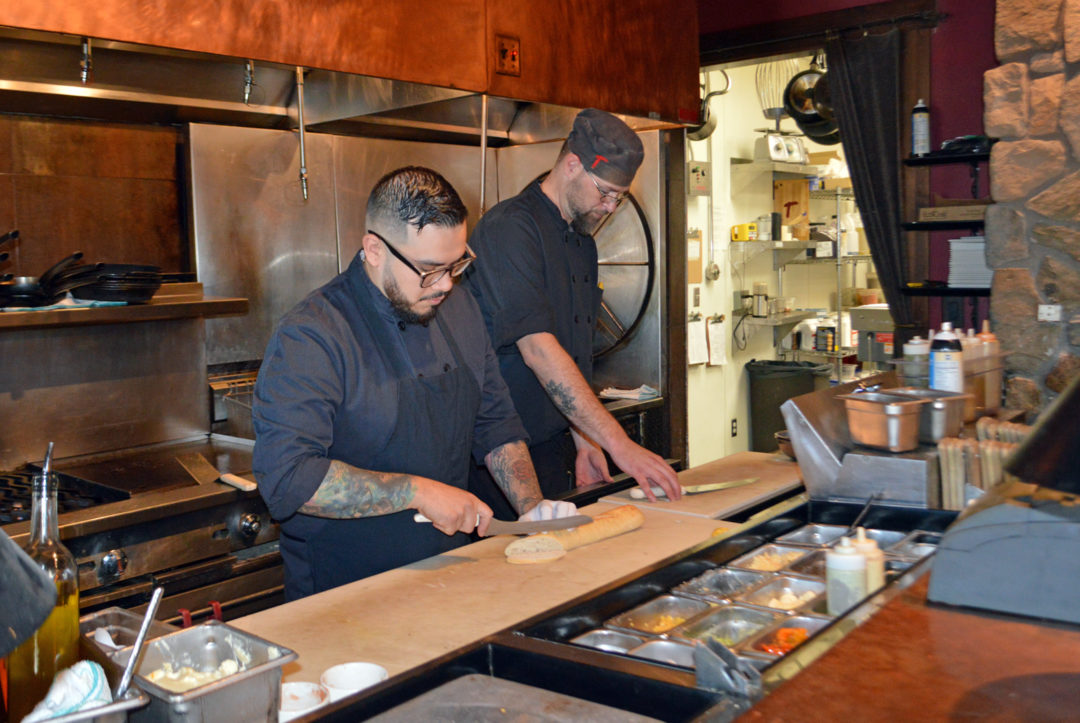
Home » CBC to launch new hospitality program to train workers
CBC to launch new hospitality program to train workers

October 12, 2017
Columbia Basin College will launch a hospitality training program in January to better prepare workers to join the ranks of more than 6,000 people who work in the growing industry in Benton and Franklin counties.
The new program was created in direct response to the increased demand for skilled restaurant and hotel workers.
“There’s a real need for developing employees with documentable skills to provide to the hospitality industry,” said Janese Thatcher, dean for career and technical education at CBC. “They can show up for a job interview showing the employer they are prepared for this job, they know what it’s about, and they know the skills that are involved. It’s almost pre-qualifying the people for the employer.”
Classes for the hospitality short-term certificate program begin in winter quarter at the Pasco college. Students may take 13 to 19 credits to earn their certificate, completing courses with titles like, “Breakfast Attendant,” “Restaurant Server,” and “Maintenance Employee.”
Successful students will earn an industry certificate from the American Hotel and Lodging Educational Institute for each completed course, and those who complete all courses receive a hospitality short-term certificate from CBC.
All hospitality courses will be taught by Marilou Shea, the creator of downtown Pasco’s Food Truck Friday program, former director of the Pasco Specialty Kitchen, as well as the developer of CBC’s Food Truck Academy. Shea said many employers see a deficit in “soft skills,” like customer service, in today’s employee pool versus hard skills, like computer knowledge and safety training.
“Soft skills are really where the challenge lies in hospitality. The desire to work, the desire to engage on a customer service level that’s professional,” Shea said. “For millennials not to be attached to their smart devices, and actually engage with customers one-on-one.”
The director of sales for TownPlace Suites by Marriott, Willie Stafford, agreed: “It’s hard for us as an employer to teach the customer service skill, and that’s the biggest part of the job. The hard skills are much easier.”
Shea envisions adding workshops and field trips to meet current employers, like Stafford, so students may learn directly from the source, providing an interactive experience on an adult level.
Visit Tri-Cities has identified a 6 percent growth in employment related to jobs in the hospitality industry.
“Increased tourism is driving the growth in the culinary industry,” Shea said. “Baseline certification is very important for the employers. Regardless of who you talk to, employers are desperate to get qualified employees in the door.”
Taverna Tagaris Sous Chef Paul Westover said he’d estimate only 15 percent of the applicants responding to a recent posting for a line cook position at the Richland restaurant were actually qualified.
“People don’t really know what the products are. And product knowledge is key. Students with a culinary arts degree from a trade school often don’t know the difference between an artichoke and an asparagus,” he said. “Line cooking is all about timing. In culinary school, you don’t really get that. Even in student-run cafeterias, you don’t get the kind of excitement you need to be a line cook.”
Thatcher shared a recent anecdote from a local hiring manager who recalled receiving 180 applications for a job posting, but only six having the baseline skills necessary to perform the core job functions.
“I see that it’s CBC’s responsibility to provide training so that we can get the people in the community that want a job trained with documentable skills that they can move into a rewarding career,” Thatcher said.
It’s expected many of the potential students would be involved with WorkSource, an employment and worker training agency, in a re-training or workforce re-entry program to qualify for tuition assistance.
Students who do not qualify and intend to take the entire 11-week program can expect to invest about $2,000. Thatcher said she hopes to develop a revolving loan fund to allow students to borrow money at a low interest rate that could be repaid and made available to the next student.
Average salaries in the hospitality industry provide a strong ladder for growth.
The average annual salary for a front desk attendant is $25,730 and rises to $159,786 for a general manager, according to Hospitality.org.
It’s not unrealistic for an employee to expect to climb the ladder from the very bottom to the very top. Hospitality.org reported half of hotel managers began their careers with an entry level hospitality position.
Stafford said he knows more than one general manager in his company who began a career as a laundry attendant, front desk representative or cook and is now responsible for running the entire hotel.
Stafford sees value in a prospective employee presenting a certificate that documents their hospitality skills.
“The biggest benefit I can see is that it would show this person is interested in the hospitality industry long term, that this isn’t just a stepping stone,” he said. “If we see someone who went through the program, paid the money and spent the time, it would be clear they have the want to remain in the hospitality industry.”
Working in the industry and growing within a corporation is a common opportunity, especially for hotel employees. Workers may have the ability to transfer to other properties, often in other parts of the country or around the world. Stafford said his employees have advancement opportunities at 600 hotels worldwide.
“There are so many people that would like an opportunity to work in a challenging place but feel like when they read the job description, they are not qualified, so getting them started in this gives them the confidence to apply,” Thatcher said.
There’s been an eight percent increase in hotel occupancy from the start of the year through August, compared to the same time last year, according to Visit Tri-Cities.
Shea said the ability to hone and validate skills for students at CBC will be a driver of economic growth as the Tri-Cities continues to add hotels and restaurants to the region.
“We can take somebody who has been laid off for six months, on food stamps, give them one quarter of training and they’re employed,” Thatcher said. “It’s very, very rewarding to see somebody who doesn’t have maybe the skills or confidence or financial ability to go into a degree program, but we can get them into this for one quarter.”
The job skills gained in a hospitality field — customer service, problem-solving and conflict resolution — are frequently transferrable to other industries.
CBC’s short-term certificate program will use curriculum developed by the American Hotel and Lodging Educational Institute and can enroll about 18 students when classes begin on Jan. 2.
“The hospital certificate we’ve developed is really like the welcome mat for people to start on their way to documenting their skills, and then, as they wish, to move on up. I believe everyone should be able to rise to their own level of confidence, skill and comfort,” Thatcher said.
Potential students can apply to enroll in the work force program through columbiabasin.edu or by calling 509-542-4804.
Local News Food & Wine
KEYWORDS october 2017





